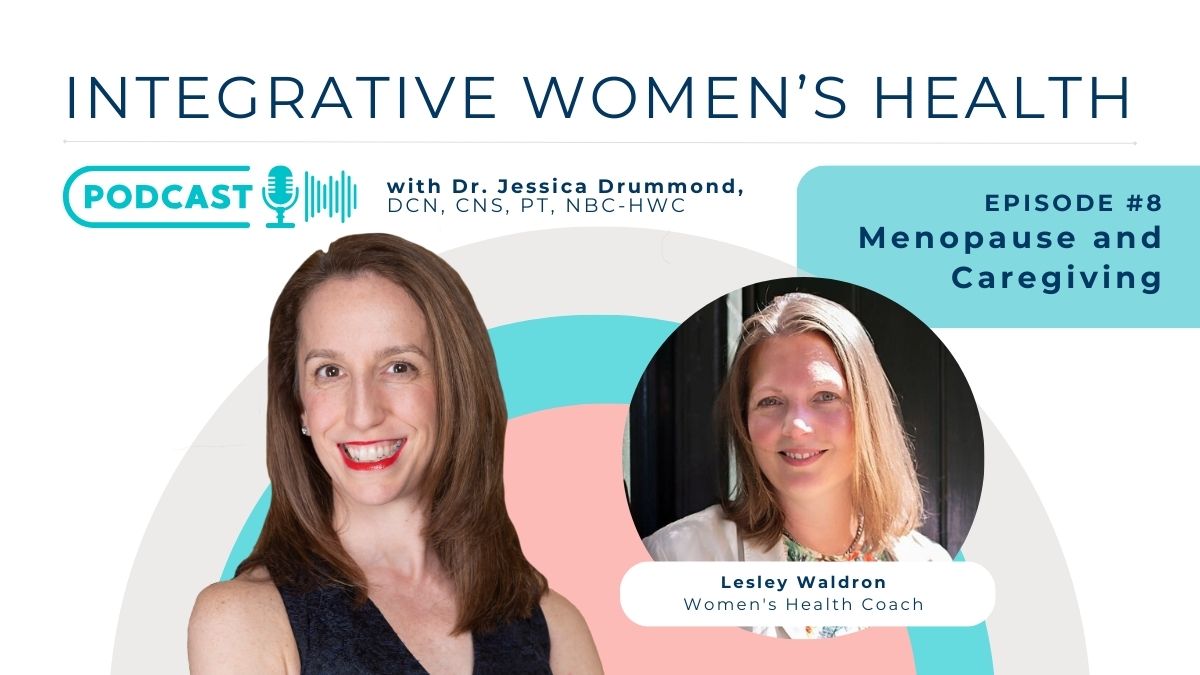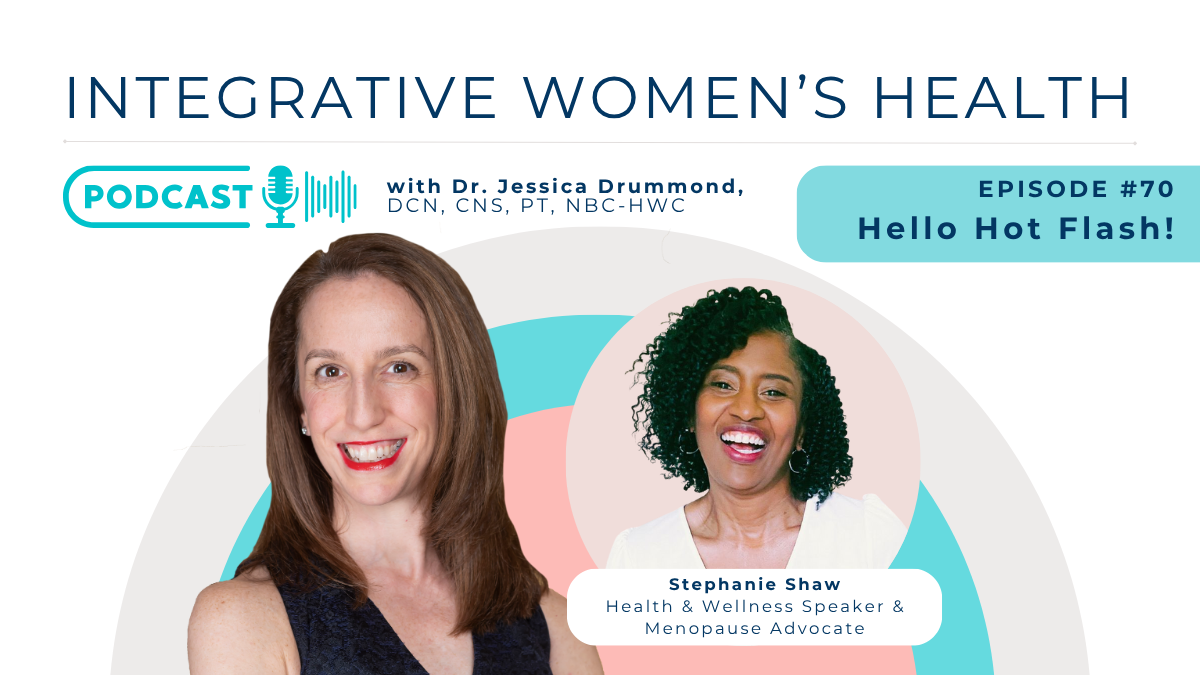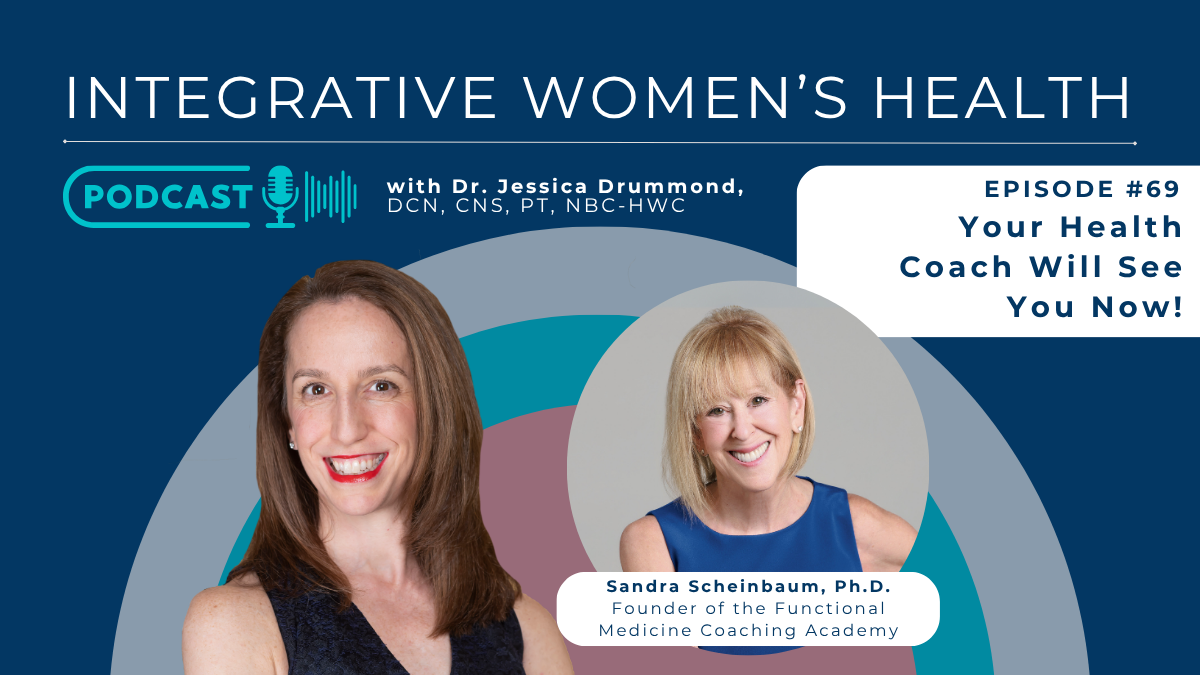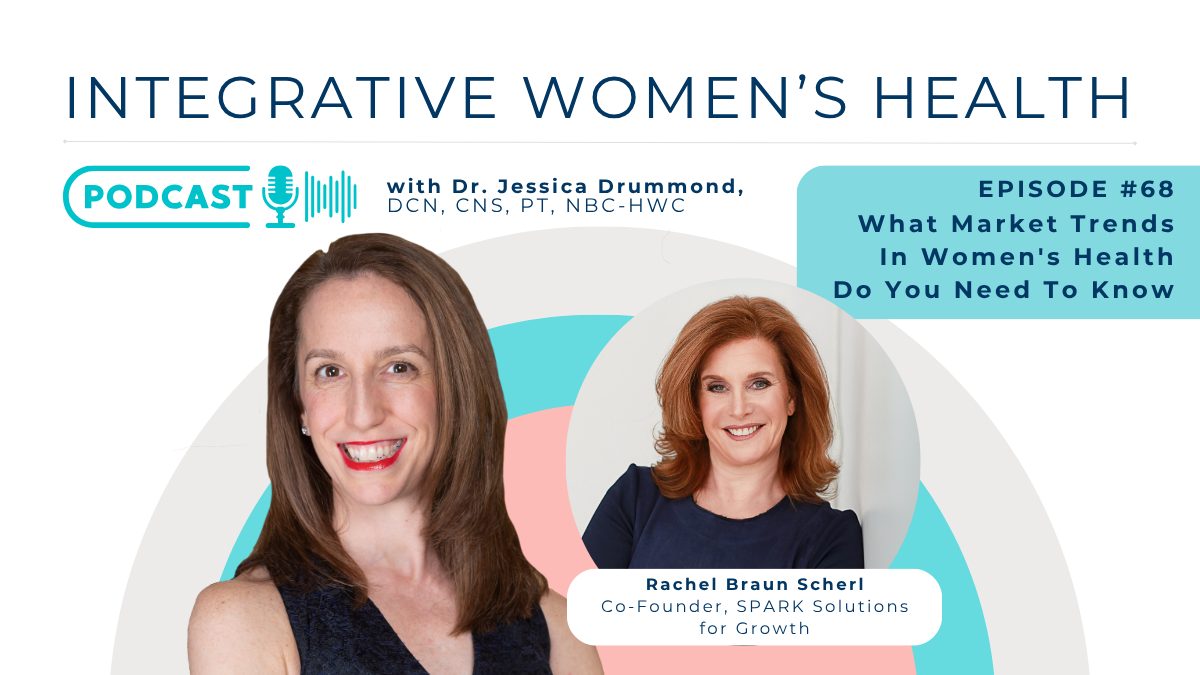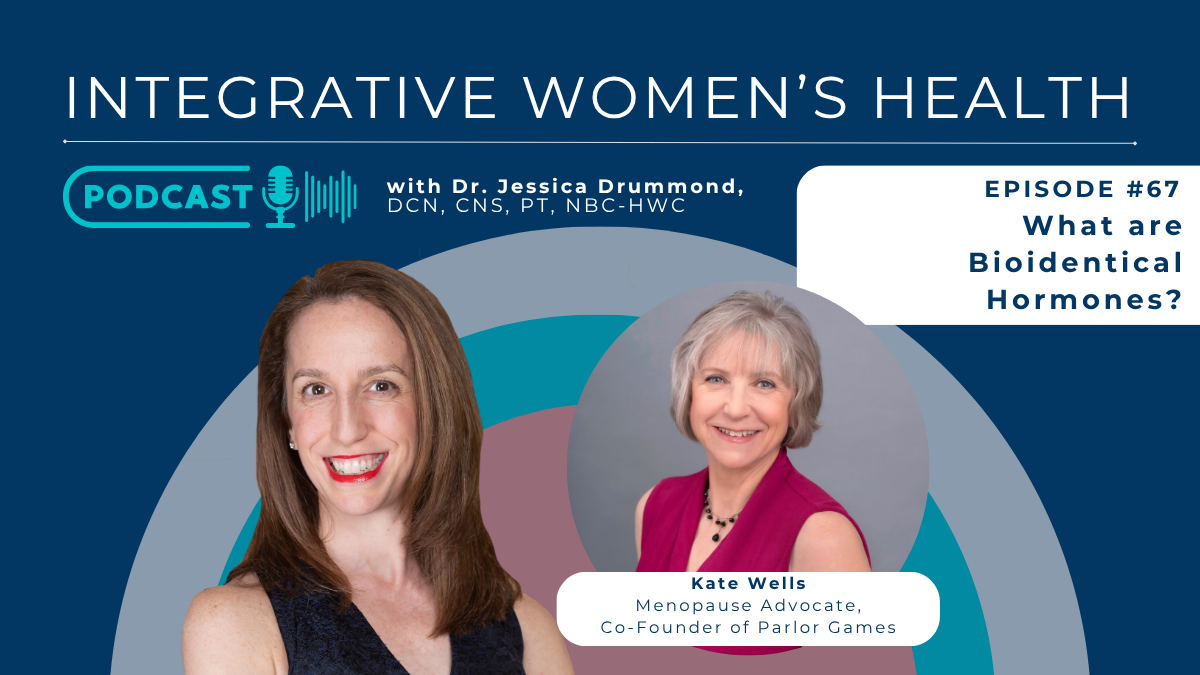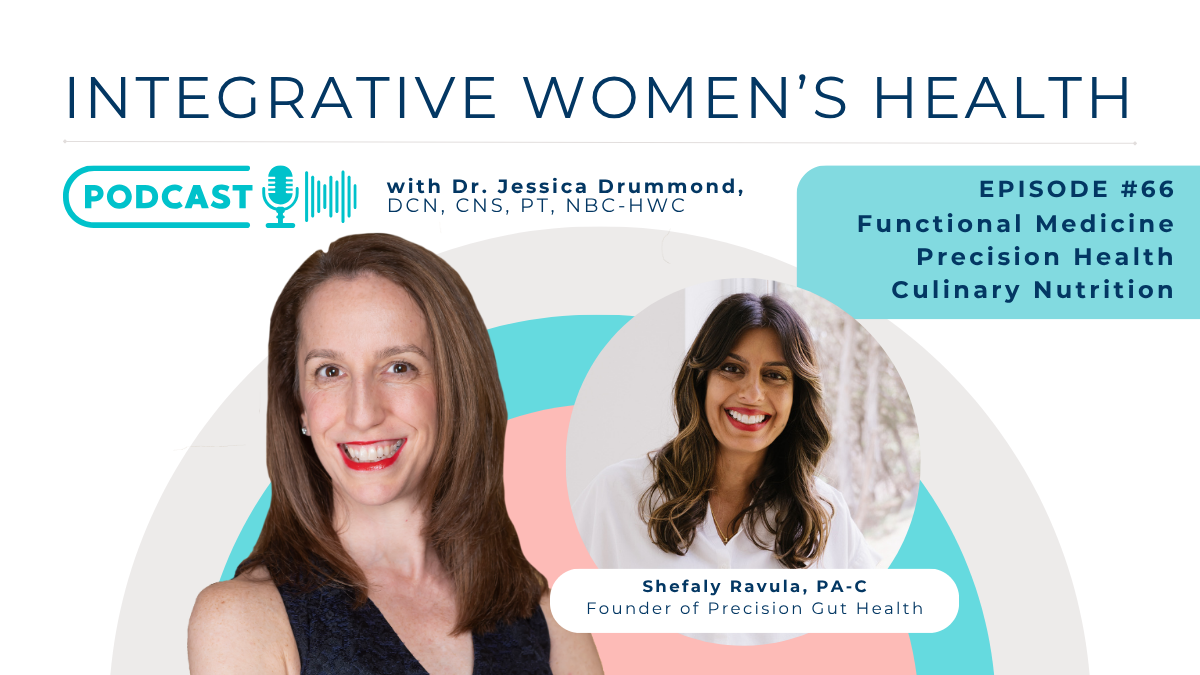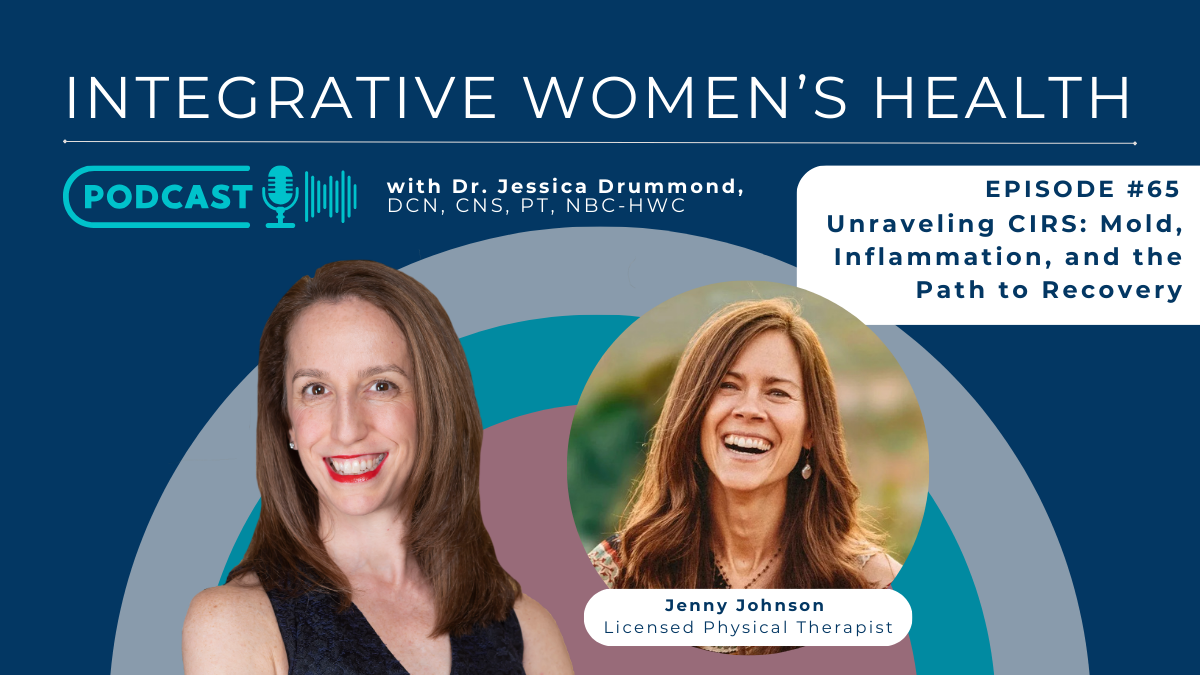Follow Us for Free:
About the episode
“Health coaching is an opportunity for us to not just serve other women in creating healthier lives but also for us as women as well.” – Lesley Waldron
The decision to become a health coach creates a significant ripple effect. As coaches, we facilitate individual transformations that empower our clients and help them develop healthier relationships with their families and communities. In addition, many of our past students say that their training positively impacted their own lives and those around them, from their health to flexibility with their time and financial freedom.
In today’s conversation, I’m excited to introduce you to Women’s Health Coach Lesley Waldron. After experiencing the power of coaching, Lesley pivoted away from her career as a personal trainer and decided to join the Integrative Women’s Health Institute’s Women’s Health Coach program. Over time, she niched down into a highly successful perimenopause and menopause practice to give her clients the tools and resources to stand independently.
Lesley’s journey is a powerful one. It shows how we can find the balance of working on our passions while caring for our families and other important areas of our lives. It also is a great example of how important it is to be open to evolving your work when life’s challenges present themselves.
Enjoy the episode, and let’s innovate and integrate together!
About Lesley Waldron
Lesley Waldron is a certified Women’s Health Coach, Perimenopause and Menopause Coach, NLP practitioner and outdoor enthusiast. She has been working as a coach since 2017 and completed the Women’s Health Coaching certification with IWHI in 2020. In addition to being a Master Coach she has a private practice in the UK supporting clients to make lasting lifestyle change to support their perimenopause to post menopause transition and delivers menopause and wellbeing workshops in schools, charities and businesses across the UK.
Lesley came into coaching from a career in public policy and higher education management via a few years as a personal trainer and running coach in her local community just outside Bristol in the South West of the UK. It was her own brush with burnout and hormone imbalance in 2014 that sent her down the route of first supporting her own health with lifestyle change and exercise and then kick started a career in supporting other women to do the same.
She also teaches outdoor fitness classes in her local community, spends as much time in the woods as possible, is a keen outdoor swimmer, and supports her daughter’s rugby team with strength and conditioning coaching.
Highlights
- Lesley’s decision to transition from personal training into women’s health coaching
- How Lesley recognized the power and potential of coaching for creating lasting change
- Why it was important to Lesley to empower clients to be able to help themselves in the long term
- The decision to become certified at the Integrative Women’s Health Insitute
- Why Lesley pivoted and decided to create a totally separate brand for her perimenopause practice
- The identity shift that comes with a career transition and being intentional about how you want to work
- How her coaching practice has helped Lesley to better balance her personal life
- Applying coaching skills to your personal life
- The value of the support and mentorship provided by the Women’s Health Coaching program
- The ripple effect of coaching and the privilege of being part of a team with the potential to impact so many people positively
- Reframing the concept of niching down as something to embrace rather than fear
Connect with Lesley Waldron
- Lesley Waldron Health Coaching | LesleyWaldron.co.uk (all things perimenopause)
- Download your FREE 4 Pillars of Perimenopause Wellbeing Guide
- Wild Country Woman | WildCountryWoman.com (outdoor fitness and wellbeing)
- Lesley Waldron on X (formerly Twitter) @WildCountryFit
- Lesley Waldron on Facebook
- Lesley Waldron on Instagram @LesleyWaldronHealthCoach
Ready to revolutionize your career and grow your practice?
- Integrative Women’s Health Institute on Instagram | @integrativewomenshealth
- Integrative Women’s Health Institute on YouTube
Learn more about The Integrative Women’s Health Institute’s Programs.
- The Women’s Health Coach Certification Program
- Perimenopause and Menopause Certificate Program
- Advanced Menopausal Health Certificate Program
- Functional Nutrition Certificate Program
- Women’s Health in Business Certificate Program
- Endometriosis Certificate Program
Click here for a full transcript of the episode.
Dr. Jessica Drummond (00:00:03) – Hi and welcome to the Integrative Women’s Health Podcast. I’m your host, Doctor Jessica Drummond, and I am so thrilled to have you here as we dive into today’s episode. As always, innovating and integrating in the world of women’s health. And just as a reminder, the content in this podcast episode is no substitute for medical advice, diagnosis, or treatment from your medical or licensed health care team. While myself and many of my guests are licensed healthcare professionals, we are not your licensed healthcare professionals, so you want to get advice on your unique circumstances. Diagnostic recommendations treatment recommendations from your home medical team. Enjoy the episode. Let’s innovate and integrate together. Hi everyone. It’s Doctor Jessica Drummond here with the Integrative Women’s Health Podcast, and I am so excited to share our guests with you today. It’s Lesley Waldron. She is a women’s health coach from the UK, and she is going to tell us so much about her interesting career journey, from starting in public policy to making the transition into the fitness world, to now having a highly successful perimenopause and menopause health coaching practice.
Dr. Jessica Drummond (00:01:32) – Now you’re going to love how much she has learned about how to evolve her work based on the needs of her family, and now that she’s caring for her elderly mother, you’re going to really see how to do that with this kind of practice. So dive in and I’ll see you on the other side. Hi Lesley, it’s so great to be here with you today, and I’m really excited to hear about your women’s health practice journey through. You know, really it’s been more than six years. And actually, you know, a little more before that when you were in your purely fitness practice. And what I think of this podcast, our goal is to support other practitioners or aspiring women’s health coaches, professionals, practitioners, all shades of health and wellness professionals to have really nourishing practices for their clients. Because we know the state of women’s health care is absolutely abysmal globally, but also because the vast majority of the people doing this work are women. You know, we want to support women’s health while actually doing their jobs as well.
Dr. Jessica Drummond (00:02:57) – So first, I would just love to hear your story of what brought you to the Integrative Women’s Health Institute in our Health Coaching certification. What was going on in your career before that?
Lesley Waldron (00:03:10) – Prior to that, was working as a personal trainer, and I had got into personal training because I reached a bit of burnout. Well, first of all, thanks for having me, Jessica. Yeah.
Dr. Jessica Drummond (00:03:21) – Of course, of course. Yeah.
Lesley Waldron (00:03:23) – So, yeah, I’ve reached a bit of burnout in my career in public policy. The thing that really helped and supported me were things like meditation and good nutrition and quitting my job, but also exercise like it was how I manage my mental health and the stress of raising small children and a job that was feeling a bit impossible. And so I really wanted to be able to give that to others, to give themselves permission to move their bodies in a way that felt nourishing. So it was never about punishment, it was always about connecting with nature and outdoors. But I was a couple of years into that, I think when I did initially, I did Jenni Burrell’s Third Age Woman certification and the time I was in my late 30s just turning 40.
Lesley Waldron (00:04:04) – And really the language that was coming out of Jenny’s work was around perimenopause. And I was like, oh my God, this is me. And I’ve never really even thought about perimenopause. So I did the Third Age woman. It was brilliant and you were a part of that. So that was the first time I came across you. But doing that certification and running a practice that was mainly around supporting women in midlife to get fit and well and to kind of take control of themselves and their lives. Again, I was like, I needed a way of serving them deeper. And I think I came across you then at a conference in London, 2016 ish, probably, and I think you were introducing this idea of coaching and you got us to coach each other. I don’t know if you remember that. I do.
Dr. Jessica Drummond (00:04:49) – I do remember that.
Lesley Waldron (00:04:49) – It was literally like a light bulb ray of sunshine. You know, this is what I meant to do because in my previous careers in public policy and I worked in universities, I’d always ended up in a coaching role.
Lesley Waldron (00:05:06) – And I’d also sought out coaching to support me in senior management roles like, I can’t do this on my own. My existing management structure was poor. I was managing a team of people who do I get to help? Me? And the coaches I’d worked with is suggested I should be a coach. And I was like, I actually don’t want to be in this environment anymore. So no.
Dr. Jessica Drummond (00:05:23) – All right, I’m ready to leave entirely.
Lesley Waldron (00:05:27) – But actually, health coaching just felt like I could do the piece that I was doing with my personal training clients so much better. And I already had this philosophy that I worked with somebody for 6 to 9 months maximum, because what I wanted was to create a positive relationship between them and their bodies and them, an exercise that lasted them for life. I didn’t want to be making small talk with the same person for years and years and years.
Dr. Jessica Drummond (00:05:54) – You wanted a real launching pad for them, essentially.
Lesley Waldron (00:05:59) – Yeah, and I still hear from people now. Who I worked with years ago, who are kind of who’ve made changes to their working pattern, who run marathons, who’ve taken up weightlifting.
Lesley Waldron (00:06:10) – And it’s absolutely brilliant. But I really wanted to go deeper and create lasting change without feeling like I needed to hold somebody’s hand to give them their power back a little bit, because there is something that’s going on, isn’t there, in this. Women will get lost in this work and motherhood, and it’s like they’re not allowed to do anything else. They don’t let themselves do anything other than running the home, looking after the kids and their job. And then it comes to a point where they reach breaking point, usually, often in midlife, and it’s just too much. Or you add that extra burden of needing to care for aging parents. So that’s what brought me to health coaching was wanting to do more. So an integrative Women’s health institute just did what I wanted to do. I looked at nutrition training, I looked at various different coaching schools, but I wanted the focus on women. I wanted to feel like it was an evidence based practice. I love that there was functional nutrition in there, but I knew I didn’t want to be a nutritional therapist, so I wanted the knowledge, but not necessarily to be practicing in that way.
Lesley Waldron (00:07:13) – So it just ticked all of my boxes. And obviously I’d come across you before. I loved your teaching style, so I knew that it was going to be the right move for me, and it definitely was. From module one of the course, I was like, oh, this is where I’m meant to be.
Dr. Jessica Drummond (00:07:27) – That’s so exciting. So your practice really, you know, your work really evolved from being in public policy, working up the ranks, learning about the skill set of coaching, which I think it’s sometimes hard to explain to people. It’s that whole idea, you know, when we were in that session in London doing that conference where I had people actually practice it, the only thing we did in that practice session, it was about ten minutes long, five minutes per person, where we simply practice the skill of mindful listening to someone’s story and I think, what light bulb moment of that for so many people, including myself when I got into the world of coaching, is that it’s so rare, and especially now, there’s a lot of opportunity for advice, for recommendations.
Dr. Jessica Drummond (00:08:18) – There’s a YouTube video on everything, but to have someone sit and witness your personal experience, I think that’s where we start to feel coaching as you did. And so when you entered the program, were there any milestones along the way, professionally or personally, that you felt really was like, okay, lit the fire under your practice and your work?
Lesley Waldron (00:08:47) – So I’d been running a program that I developed out of the Third Age hormone called the Feelgood 40s that was around perimenopause, education and perimenopause and lifestyle change. And I absolutely love doing that. And again, the light bulb moments that I shared with people, and I was increasingly dissatisfied with personal training and actually with the fitness industry, which angers me, particularly at this time of year. It feels really predatory.
Dr. Jessica Drummond (00:09:11) – Yeah, the back to January, back to fitness. Yeah.
Lesley Waldron (00:09:15) – New year, new you. Absolute nonsense. Punish ourselves to make ourselves smaller. Whereas I think that movement and exercise can make ourselves feel bigger and more powerful. And that’s what we should be aiming.
Dr. Jessica Drummond (00:09:28) – Absolutely.
Lesley Waldron (00:09:29) – And then came 2020. And it was like that felt I was largely a face to face business in person, you know, outdoors. And at the beginning I thought, well, I can carry on because I do some of the coaching I would do walking some of the I taught classes, personal training. It was all outside. And then obviously it became clear that that wasn’t going to be possible. And that was the opportunity to go right. I’m going to finish the course and dive into my perimenopause practice. And that was then the beginning of kind of experimenting with only putting myself out there as a perimenopause coach with creating a new brand like separate to my fitness brand, because that felt like it was an important part of that process. But I probably started around that way. So initially I wanted to give it to as many people as possible. And so I started with a membership and I would do a weekly workshop, which was kind of coaching principles really, about getting people delivering some information, but then really getting the women there to engage with what their choices were.
Lesley Waldron (00:10:31) – But it didn’t quite work. But love is the deep work. But it was 2020 that was that real pivot towards. No, this is what I’m putting myself out as. I’m a perimenopause and menopause coach, and I really needed to learn how to present myself slightly differently and to almost educate my existing audience and create a new audience that was for coaching, not being told what to do, but to be coached into finding your own path through. Because that’s the magic of it.
Dr. Jessica Drummond (00:10:58) – Really, for sure.
Lesley Waldron (00:11:00) – And then I think it was end of 2020, I started to get my first clients who would work with me over 3 to 4 months and into 2021. That was when I kind of really did the work on the branding, but it took a couple of years of really trying to establish myself in that way.
Dr. Jessica Drummond (00:11:15) – Yeah. So through the programme, it was essentially a transition from, you know, purely fitness coaching to deeper coaching with small groups one on one and claiming your role as a perimenopause and menopause coach.
Dr. Jessica Drummond (00:11:33) – And I think this is one of the things that so many people that come through the program experience, there’s almost an identity shift for yourself. It’s not just a career shift, it’s an identity shift. And it’s around choosing how you work that best serves you and your family life. So what kind of changes were you seeing from that perspective? You know, your ability to make more money because you can work with more people, like all of these different levels of job change that affect your personal life.
Lesley Waldron (00:12:06) – Yeah. And the flexibility of it. So I can work less and earn more money than I did as a personal trainer. There was a shift in mindset, definitely around charging more money, which is a piece that I think often we come through when we initially become set up, our own practice when we certify as a coach. And it was an interesting piece of work. But yeah, and also I can just flex around what I do, understanding who do I want to work with and how can I best serve them in a way that also serves me, like you were saying right at the beginning here, about how health coaching is an opportunity for us to not just serve other women in creating healthier, more, thrive better through their life, but also for us women as well.
Lesley Waldron (00:12:55) – And in the last two years, I’ve been supporting my mother, who has Alzheimer’s, and that’s taken up a chunk of my time.
Dr. Jessica Drummond (00:13:02) – Absolutely.
Lesley Waldron (00:13:04) – And it has at times felt like it wasn’t a choice that I had to do it. But the skills that I’ve learnt as a coach have been helpful for my own self-care as well as hers. But also my practice has been able to kind of shrunk slightly, but I haven’t burnt out, which is what I have seen happen to others. And my mum has been supported, but I’m still connected to my purpose. I don’t feel like I’ve sacrificed everything, so that’s really important. And then I’m and my phase where my mother may go into long term residential care in the next few months. There’s a lot of work to do then, but actually, that’ll give me space to grow again. So I never feel like the shrinking will only have been able to create space for more growth and for a practice that will serve more women. Because I’ll have learned quite a lot through the process of the last couple of years, through almost applying what I’ve learned to myself and my family as well.
Dr. Jessica Drummond (00:14:05) – Yeah. Can you give us a little more specific around that? I see this a lot with our students and our graduates that they go through the program, they learn the skill set of coaching, they’re using it with their clients. And then either something happens in their marriage and they’re, you know, parenting. They move, they’re trying to make new friends. They’re caring for elderly parents, something like that. How did you then apply the coaching skills to your life to support, you know, your mom right there in front of you and yourself so that you can navigate this journey with a lot more peace? Because caring for someone with Alzheimer’s or any type of dementia, or any type of heavy physical needs or emotional mental needs is a huge job.
Lesley Waldron (00:14:53) – So I have always journaled but actually developed some different practices, like through doing the coaching program. I realized that having that daily conversation with myself was essential. And in the last couple of years, even more so because actually I can flick back and go watch myself kind of go down and then work out that actually I need to pick myself back up on menstrual cycle tracking, something that I talk to myself again.
Lesley Waldron (00:15:22) – I’m like, actually, if my cycle is getting longer or my period pains or my premenstrual experience is more difficult, then that’s also an indicator. So these are things that I will have learned and applied through the program and to my clients over time. And it’s a way of going, oh my God, I am losing it. Day 22 of my cycle. And yes, I can usually get irritable. But if the wall of rage is coming down, then that doesn’t help anyone around me. But it really doesn’t help myself. And so then actually what I would do is then call in support. I have got friends who are on a similar journey, but actually I’ve also worked with an emotional wellbeing coach with like emotional kinesiology, but she’s kind of looks at the balance of what’s going on in my life and my kind of nutrition and things like that. Actually, this is when I can support myself, and this is when I need to call in for extra support. And then I have refocused on different practices.
Lesley Waldron (00:16:20) – So a daily meditation practice, mindfulness practice was a game changer last year, and I hadn’t realized I’d let it slip, you know, once or twice a week. But no, back to like a minimum of six days a week. And the way that that calibrates my mind and my self-awareness through the day is huge. And then sometimes that ability, like when we’re coaching somebody, we need to be able to step back and not get personally involved. Right? We need to be able to listen without judging, without engaging. And actually, that’s helped me with being compassionate towards my mother just to kind of step away and go, actually, do you know what’s going on for her that she’s reacting in this way? Why does she need to call me 24 times a day? And how can I change that so that we can all maintain our sanity? So yeah.
Dr. Jessica Drummond (00:17:16) – Absolutely. You know, it’s interesting, one of the biggest challenges people have when they are considering enrolling in our program is they’re like, well, we’re not the least expensive program.
Dr. Jessica Drummond (00:17:27) – And I’m well aware of that because it’s been my commitment over time. And we of course, reassess this all of the time. But I really feel like that support aspect, you know, we have a true master coaching staff, all of whom have been coaching at least 5 to 10 years. I’m still personally supporting our students. And I think what you said there about, you know, you have then reached out for your own level of support. One of the reasons why we get so many people coming through our program who have already graduated from other health coaching programs, is that they don’t feel that level of confidence and support. So can you speak to that a little bit in the value of that in your work and life?
Lesley Waldron (00:18:12) – Oh my goodness. Through the program, I’ve spoken to other people who’ve either done coaching, straight coaching program, sort of life coaching or the nutrition programs that are out there, right, or health coaching, and none of them have had the depth that we’ve had, but also the support, right? The support to I loved the retreats, the fact that there’s a weekly call that you can just pop into whatever stage in the program you are to get feedback or support and ask a question, no matter how kind of silly or insignificant it is, because.
Lesley Waldron (00:18:46) – As you know from previous calls that their answer will help other people in the group. Susan Clinton was my master coach, and it just helped me to both get that feedback on my own coaching skills and from somebody that experienced. To be giving me that feedback felt like it was a real when it was positive feedback, it was great when it was feedback that was about encouraging my development. It was done in such a nourishing way anyway. So yeah, and then the fact that we’re encouraged and supported to find a tryout, so then you’re going through it, you’ve got the wider group, you’ve got your master coach, and then you’ve got your little unit. And I think I’ve almost kept that going, like I’ve always been part of some group. I was in your business mastermind for a while. I love being part of group business programs or networking events because that’s part of my kind of support community. And I’ve always had close groups of friends, small groups in a similar position to me in terms of their business and life and such like.
Lesley Waldron (00:19:46) – So I think that you learn so much from that program that actually can go forward into developing a really nourishing business life, too. Yeah.
Dr. Jessica Drummond (00:19:54) – And I think, you know, you then recognize the value of pulling in any level of support that you need, whether it’s, you know, care for your mother or emotional care for yourself in so many different ways. And that’s the thing that I see, sort of, you know, that ripple effect of our graduates. And then, lucky for us and our new students, you’re also now one of our master coaches. So I’m excited. I’m so excited about that massive privilege.
Lesley Waldron (00:20:24) – Something that I still pinch myself, but it’s just so I love it because I can see myself in those new students. And yeah, they’ve had incredible careers and I feel really excited about what they’re going to do with this qualification. I think, yes, it’s not the cheapest out there, but the value for money. I think from the moment they first start the program and start tapping into the master coaches and the weekly calls, everybody feels the value of it.
Lesley Waldron (00:20:53) – It’s a real privilege to be part of the team, and I’ve always been big on the ripple effect. So even as a personal trainer, I was like, well, actually changing this woman’s relationship with exercise and her body will help support her family, her kids to have positive relationships, and her friends and her partner and their kids friends. Maybe perimenopause coaching the ripple effect onto colleagues, onto family, onto their girlfriends. I always think, like, if I can support somebody in a way that they can support 10 to 25 other people, how amazing is that? And then to support a coach to do that, it’s like that ripple effect is even wider. So it’s a real privilege to be part of it and to re-engage with the brilliant material in the program, too.
Dr. Jessica Drummond (00:21:39) – Yeah. Well, thank you so much. We love having you on the team. And one of the things you said about our students, you know, when they come, not everyone is a health or wellness professional when they start.
Dr. Jessica Drummond (00:21:51) – This is a career changing program. And many are health and wellness professionals who have had that experience for 25 years before they start, or five years or one year. But what I love is that everyone brings such value to the community because, as you said, like you are teaching them and mentoring them to have a specific skill set and everyone brings their collective work experience to our community and life experience, and they’re so willing to share, which is so valuable for the whole community. And so I wanted to ask two things that I want to wrap this podcast, you know, for everyone. So if you could ask one question to a colleague and I think it could be a peer, it could be someone a couple of years ahead of you and the kind of business that, you know, we do our visioning workshops every year. So the vision that you see for yourself, whether it’s this year or a little further in the future, what would be one question that I can then take and ask to one of our next guests?
Lesley Waldron (00:22:56) – Oh, so somebody who’s a bit further along, I suppose it’s about.
Lesley Waldron (00:23:02) – So as I said, I’ve kind of been keeping my business and my practice to one that ensures that I’m supporting myself or my mother, and I feel like I’m ready almost to relaunch myself a little sort of what should be by the middle point of this year. And so I suppose what I would ask somebody would be, when do you know that it’s time to grow your team?
Dr. Jessica Drummond (00:23:29) – I love that question. All right. Well, we’re going to take that little nugget and I’m going to place it over here and we’ll ask our next guest. And I would like for you to have the opportunity now to impart one piece of advice. House for a colleague who is either the same level or slightly following you, or looking to shift in a way that you have, what would be kind of one nugget that you could share.
Lesley Waldron (00:23:58) – One of the things that can feel really stressful for somebody at my stage of business, or even a little bit behind, or perhaps one of our students, is this feeling like you need to really niche down and it can feel really restrictive.
Lesley Waldron (00:24:11) – And I would say is that don’t fear the niche, but also don’t let it rule you. Because actually having clarity about who you want to serve makes it much easier both to market your business. And to serve the client. But it doesn’t mean that somebody who’s got another need doesn’t fit your model as well. So don’t be afraid of it, but just know that it helps so much.
Dr. Jessica Drummond (00:24:39) – That’s such valuable advice because, you know, we’ve always had niche markets in our clients programs of every different stripe. And every once in a while, you know, I get a DM or something of like, can you help my husband or my teenager or my mother? And sometimes I say no, and I refer those people on, but other times, absolutely. And I think just because it supports your marketing, you still have lots and lots of skills that you could support other people and that will happen. And I think you’re right. You get to then sort of make that decision whether you want to serve those people or not.
Lesley Waldron (00:25:18) – But exactly.
Dr. Jessica Drummond (00:25:20) – Yeah. That’s great. All right. Well, thank you so much, Leslie, for being here for sharing your wisdom, for sharing your experience. And all of our future students are so lucky that they will get to have you as their master coach now.
Lesley Waldron (00:25:37) – So you’re so welcome, Jessica. Thank you for having me. I look forward to all of those future students I get to speak to.
Dr. Jessica Drummond (00:25:45) – Excellent. Thank you so much.
Lesley Waldron (00:25:47) – You’re welcome.
Dr. Jessica Drummond (00:25:52) – I loved that interview with Leslie so much, and I’m so honored that she has become a master coach in our community. I think my key takeaway from this interview was that when you decide that flexibility is a value for you in creating your practice because you want to spend more time and more flexibility and taking care of your children or aging parents. If you want to be really active in your community or you have hobbies you want to spend time doing, if you’re intentional about creating a women’s health coaching practice, where a core value is flexibility that can grow with you through your life no matter what happens.
Dr. Jessica Drummond (00:26:37) – And that little nugget that Leslie gave us about using the coaching skills to even help in her own life, to create boundaries with her mother as she’s dealing with the struggles of Alzheimer’s dementia. Oh, that really warms my heart because the coaching skills are valuable not just for your clients, but for you. And Leslie is such a beautiful, living example of that. Thank you, and I’ll see you next time. Thank you so much for joining me today for this episode of the Integrative Women’s Health Podcast. Please share this episode with a colleague and if you loved it, hit that subscribe or follow button on your favorite podcast streaming service so that we can do even more to make this podcast better for you and your clients. Let’s innovate and integrate in the world of women’s health.
Join Dr. Jessica Drummond to learn the three key steps to becoming a successful, board-certified Women’s Health Coach who leaves a lasting positive impact on their clients.
Learn how utilizing health coaching skills in your practice is crucial to your success, leaving a lasting impact on your clients, and shifting the paradigm of women’s healthcare.

Dr. Jessica Drummond
Founder & CEO
The Integrative Women’s Health Institute
At the Integrative Women’s Health Institute, we’ve dedicated 17 years to crafting evidence-driven, cutting-edge programs that empower practitioners like you to address the complexities of women’s health.
Dr. Jessica Drummond’s unique approach focuses on functional nutrition, lifestyle medicine, movement therapies, nervous system dysregulation, trauma, and mindset – essential elements often overlooked in traditional health education.
In addition, your training will be fully evidence based, personalized, and nuanced (this is not a cookie cutter approach) in functional nutrition, exercise, recovery, cellular health, and all other lifestyle medicine tools.
You’ll learn to support your clients with cutting edge tools safely and effectively.

